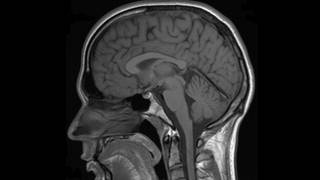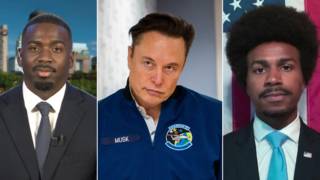
At a campaign rally in Huntsville, Alabama, on Friday evening, Trump lashed out at players who have joined a growing protest movement started by former 49ers quarterback Colin Kaepernick against racial injustice, kneeling during the national anthem ahead of games. We get response from former NFL player Donté Stallworth, who spent 10 years in the league and is now a sports commentator, who says, “We can’t allow the president to hijack this conversation and make it all about him.”
Transcript
AMY GOODMAN: I wanted to bring in our third guest, who has been waiting patiently, Donté Stallworth, former NFL star. Oh, you’ve played with the Philadelphia Eagles, the New England Patriots, Cleveland Browns, Baltimore Ravens and beyond. A lot of those teams took action yesterday. Your thoughts and feelings as you saw them on the field and also those that just stayed back in the locker room for the playing of the national anthem?
DONTÉ STALLWORTH: First, I wanted to say that I totally agree with and share Dave’s sentiments on Dr. Edwards and appreciate everything that he has done and everything that he is continuing to do in staying engaged in this political debate and in this environment.
HARRY EDWARDS: You guys are going to make me cry. I appreciate it.
DONTÉ STALLWORTH: And yeah, so we just wanted to say, definitely, definitely appreciate you, Dr. Edwards.
HARRY EDWARDS: Thank you.
DONTÉ STALLWORTH: Amy, I believe that when you look at the players—and we all kind of use the word “solidarity,” and that’s exactly what it is. It’s brotherhood amongst people that are in the locker room. We see each other every day. We are essentially like family, and we treat each other like brothers. And so when I see guys that have—long before today or long before the last couple weeks, guys have been engaged in this political discourse, not just by talking about it, but they’ve been engaged, where the president himself has been absent or has been in opposition to these reforms, and helping to make this country a more perfect union.
And by that, I’ll say this. You get a guy like Chris Long from the Philadelphia Eagles. He has donated or he is donating his first six game checks—his first six out of 16 total game checks, he is donating to his hometown in Charlottesville, where, obviously, they had the white supremacists and the Nazis marching openly and freely. He is donating money to, as he called it, promote equality through education. Donald Trump and his administration has worked to defund groups that counter white supremacists, extremists. The DHS and the FBI came out with a joint intelligence briefing back in May, and they warned heavily about the—they warned heavily about the dangers of these white supremacists using violence. And you see that the players have worked much more than the president has on these reform issues. You go to Doug Baldwin of the Seattle Seahawks, who met with the Seattle police chief and met with police officers from the police department. He also spoke and had a meeting with the Washington state’s attorney general. Malcolm—excuse me, Malcolm Jenkins and Anquan Boldin have been to the Capitol to speak to members of Congress. I was able to—they invited me out on one trip where, three straight days, we spoke to members of Congress on both sides of the aisle to move the needle forward about these issues, in criminal justice reform and beyond. The players have taken the initiative where the president has been absent and where he has been in opposition towards these reforms.
So the players themselves now have even seen, now so more than ever, that the president is in complete and total opposition to allowing players, number one, their First Amendment rights. That’s the first thing. And I think the other thing, too, that we have to be conscious of is to not allow Mr. Trump to hijack this conversation, to hijack the narrative. You know, obviously, it’s going to be in the media. We’re going to talk about it for a day or so. But after that, let’s make sure that we’re keeping our eye on the prize. And I think Dr. Edwards and, both, Dave alluded to that earlier. That’s the main focus where we need to keep this. We can’t allow the president to hijack this conversation and make it all about him, because, as we all know, he does love attention.
AMY GOODMAN: Donté Stallworth, you mentioned Charlottesville. President Trump has spent more time now attacking black athletes and calling for them to be fired than he has spent in any way criticizing the torch-carrying protesters, the white supremacists in Charlottesville. Can you talk about what we saw this weekend in—and, of course, it wasn’t lost on people—in Alabama? I mean, in the mainstream media, you’ll often hear a question: Did—he didn’t realize the blowback that he would have. Isn’t it exactly why he did it? Of course he understands what kind of response. I mean, whether he’s doing it to divert attention from perhaps losing the healthcare bill this week, not clear, but he has a very clear, consistent pattern of taking on these issues of white supremacy through his campaign. Talk about Charlottesville and who he’s attacking today and who he didn’t attack and criticize.
DONTÉ STALLWORTH: You always look at the president and when he speaks, and you listen to him, his initial reaction, his natural reaction, not a scripted tweet or not a scripted speech, you listen to him off the cuff, you listen to him at his rallies, you listen to him at 6:00 in the morning when he’s—God knows what he’s doing at 6:00 in the morning, but you listen to him when he’s tweeting at 6:00 in the morning, you look at what he is naturally inclined to say about these issues, again, not from a scripted tweet or a scripted speech, and time and time again what he has shown is an adversarial tone to professional athletes, to people who are in opposition to his ideology, to his politics.
And he has shown somewhat of an affinity for people that are dictatorial figures. And I say that he has obviously—has said things about Russian President Vladimir Putin. He’s said favorable things about the Philippines President Rodrigo Duterte, and we all know about him and his mass killings with his, quote-unquote, “war on drugs.” And he’s even said it would be an honor to meet Kim Jong-un. He aspires to be a dictator. He’s like the little dictator that could. He aspires to be a full-blown dictator.
And he’s fighting against people that are in opposition of white supremacists and Nazis. He doesn’t defend NFL players’ or American citizens’ first right—or, First Amendment right, but he will defend and even embolden white supremacists, as he does not, again, call them out within the first 48 hours. And we have to—you get the media that has to come down on him and condemn—or get him to condemn these white supremacists and Nazis that are marching in the street, when it should should be a natural reaction. To me, that’s very telling. Don’t give us a scripted speech or a tweet. We need to hear what you think, you know, when it happens, naturally, in the heat of the moment. And he’s shown time and time again where his ideologies lie.
AMY GOODMAN: We have to break, but when we come back, we’re going to continue this discussion. We also want to bring in another issue, and that is CTE—that is the tragic brain injury that NFL players suffer—and talk about—you know, people are saying Colin Kaepernick began this all. I mean, I think the link is—we’ve got Dr. Harry Edwards here—going from Colin Kaepernick back to John Carlos—right?—and Tommie Smith, back in 1968 at the Mexico Olympics. We’re going to talk about all of this. Stay with us.













Media Options